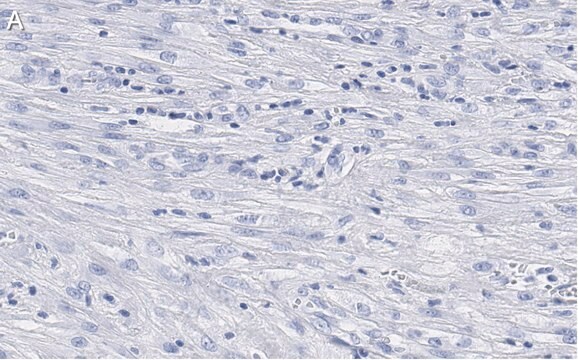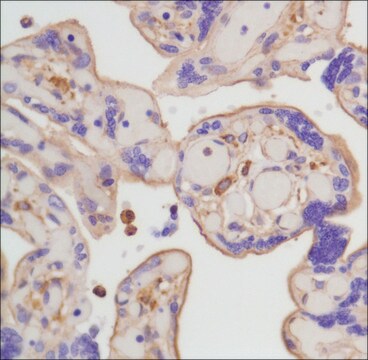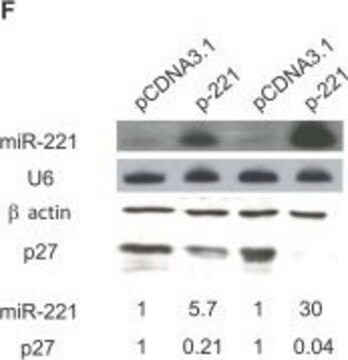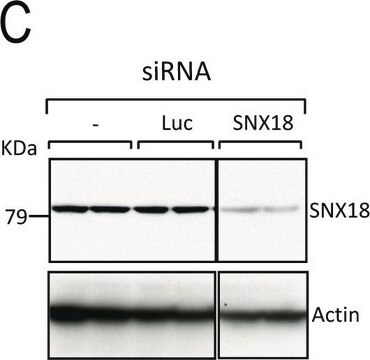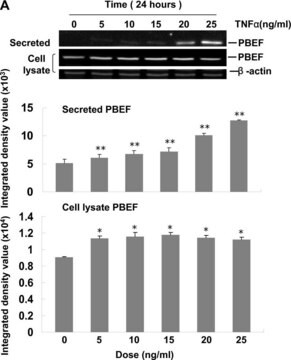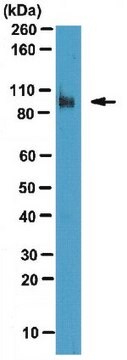ZMS1156
Anti-β Actin Antibody, clone 4C2 ZooMAb® Mouse Monoclonal

recombinant, expressed in HEK 293 cells
Synonyme(s) :
Actin cytoplasmic 1
About This Item
Produits recommandés
Source biologique
mouse
Niveau de qualité
Produit recombinant
expressed in HEK 293 cells
Conjugué
unconjugated
Forme d'anticorps
purified antibody
Type de produit anticorps
primary antibodies
Clone
4C2, recombinant monoclonal
Description
recombinant, expressed in HEK 293 cells
Gamme de produits
ZooMAb® learn more
Forme
lyophilized
Poids mol.
calculated mol wt 41.74 kDa
observed mol wt ~40 kDa
Produit purifié par
using protein G
Espèces réactives
monkey, mouse, human, rat
Conditionnement
antibody small pack of 25 μL
Caractéristiques du produit alternatif plus écologique
Waste Prevention
Designing Safer Chemicals
Design for Energy Efficiency
Learn more about the Principles of Green Chemistry.
Validation améliorée
recombinant expression
Learn more about Antibody Enhanced Validation
Technique(s)
flow cytometry: suitable
immunohistochemistry: suitable
western blot: suitable
Isotype
IgG1κ
Séquence de l'épitope
N-terminal
Numéro d'accès Protein ID
Numéro d'accès UniProt
Autre catégorie plus écologique
Conditions d'expédition
ambient
Température de stockage
2-8°C
Informations sur le gène
human ... ACTB(60)
Description générale
Spécificité
Immunogène
Application
Evaluated by Western Blotting in HeLa cell lysate.
Western Blotting Analysis: A 1:10,000 dilution of this antibody detected β Actin in HeLa cell lysate.
Tested Applications
Western Blotting Analysis: A 1:10,000 dilution from a representative lot detected β Actin in Jurkat, COS-7, NIH3T3, and PC12 cell lysates.
Immunohistochemistry (Paraffin) Analysis: A 1:1,000 dilution from a representative lot detected β Actin in human small intestine and human epididymis tissue sections.
Flow Cytometry Analysis: 1 µg from a representative lot detected β Actin in one million HeLa cells.
Note: Actual optimal working dilutions must be determined by end user as specimens, and experimental conditions may vary with the end user.
Description de la cible
Forme physique
Reconstitution
Stockage et stabilité
Autres remarques
Informations légales
Clause de non-responsabilité
Vous ne trouvez pas le bon produit ?
Essayez notre Outil de sélection de produits.
Code de la classe de stockage
11 - Combustible Solids
Classe de danger pour l'eau (WGK)
WGK 1
Point d'éclair (°F)
Not applicable
Point d'éclair (°C)
Not applicable
Faites votre choix parmi les versions les plus récentes :
Certificats d'analyse (COA)
Désolés, nous n'avons pas de COA pour ce produit disponible en ligne pour le moment.
Si vous avez besoin d'assistance, veuillez contacter Service Clients
Déjà en possession de ce produit ?
Retrouvez la documentation relative aux produits que vous avez récemment achetés dans la Bibliothèque de documents.
Notre équipe de scientifiques dispose d'une expérience dans tous les secteurs de la recherche, notamment en sciences de la vie, science des matériaux, synthèse chimique, chromatographie, analyse et dans de nombreux autres domaines..
Contacter notre Service technique